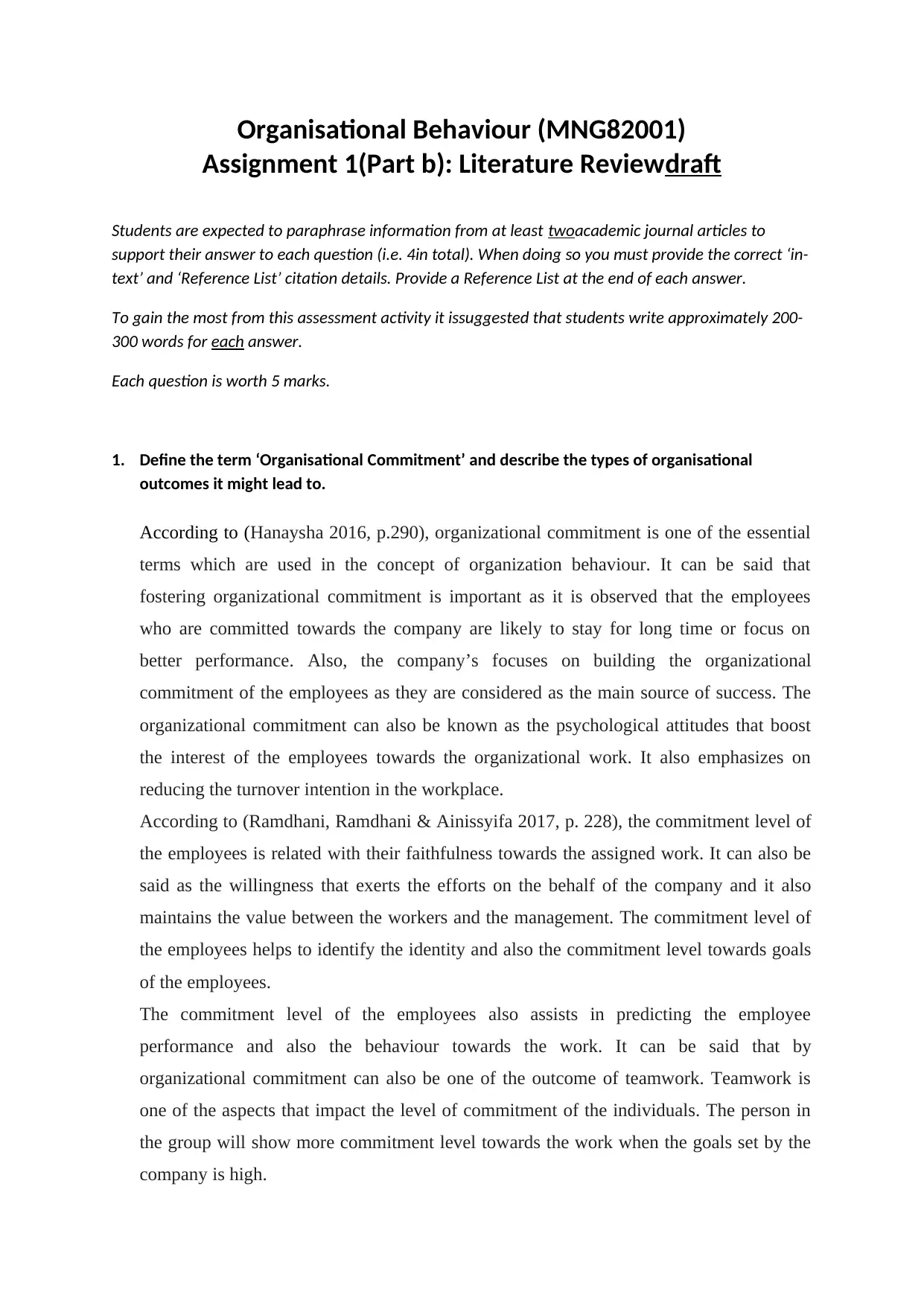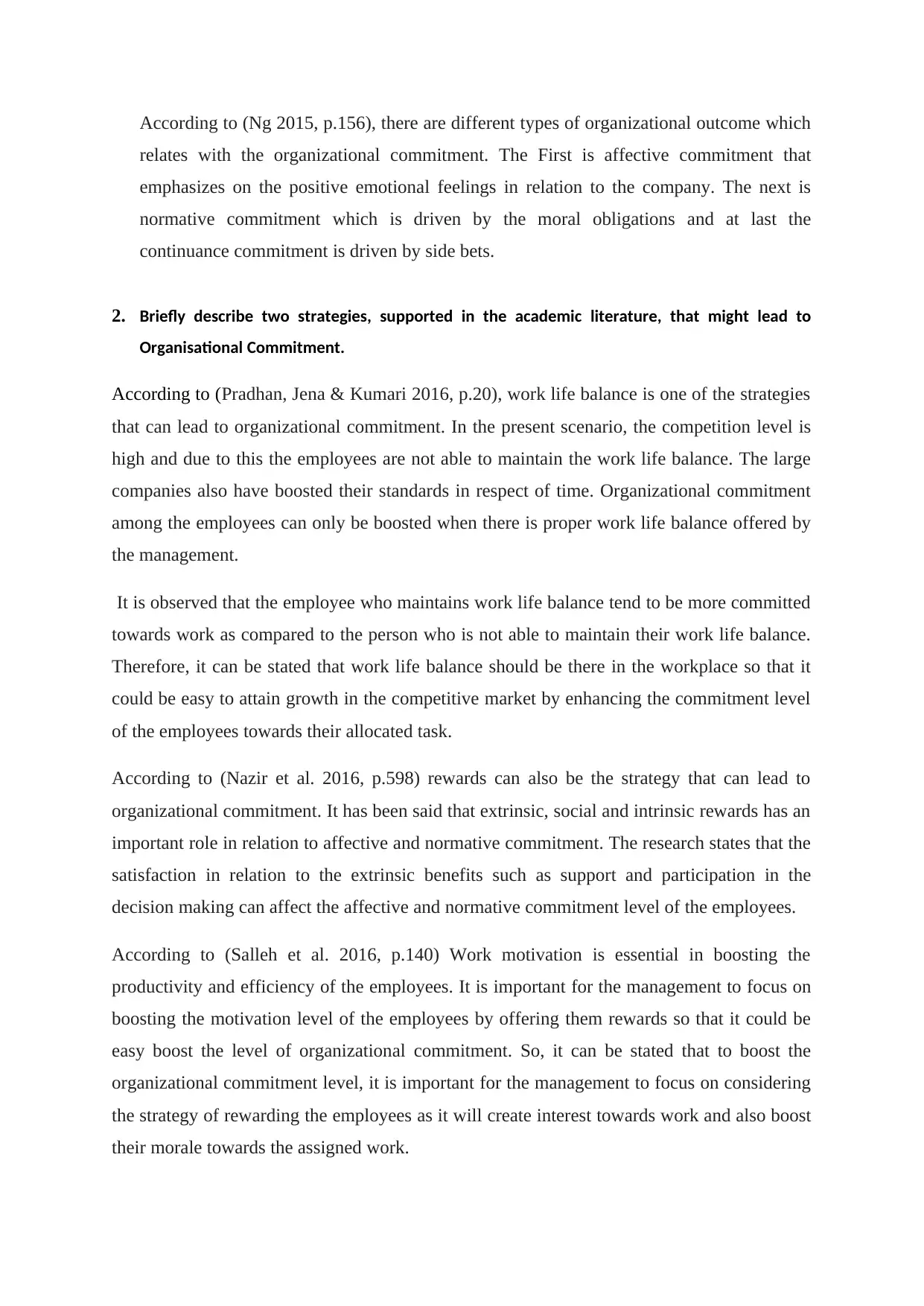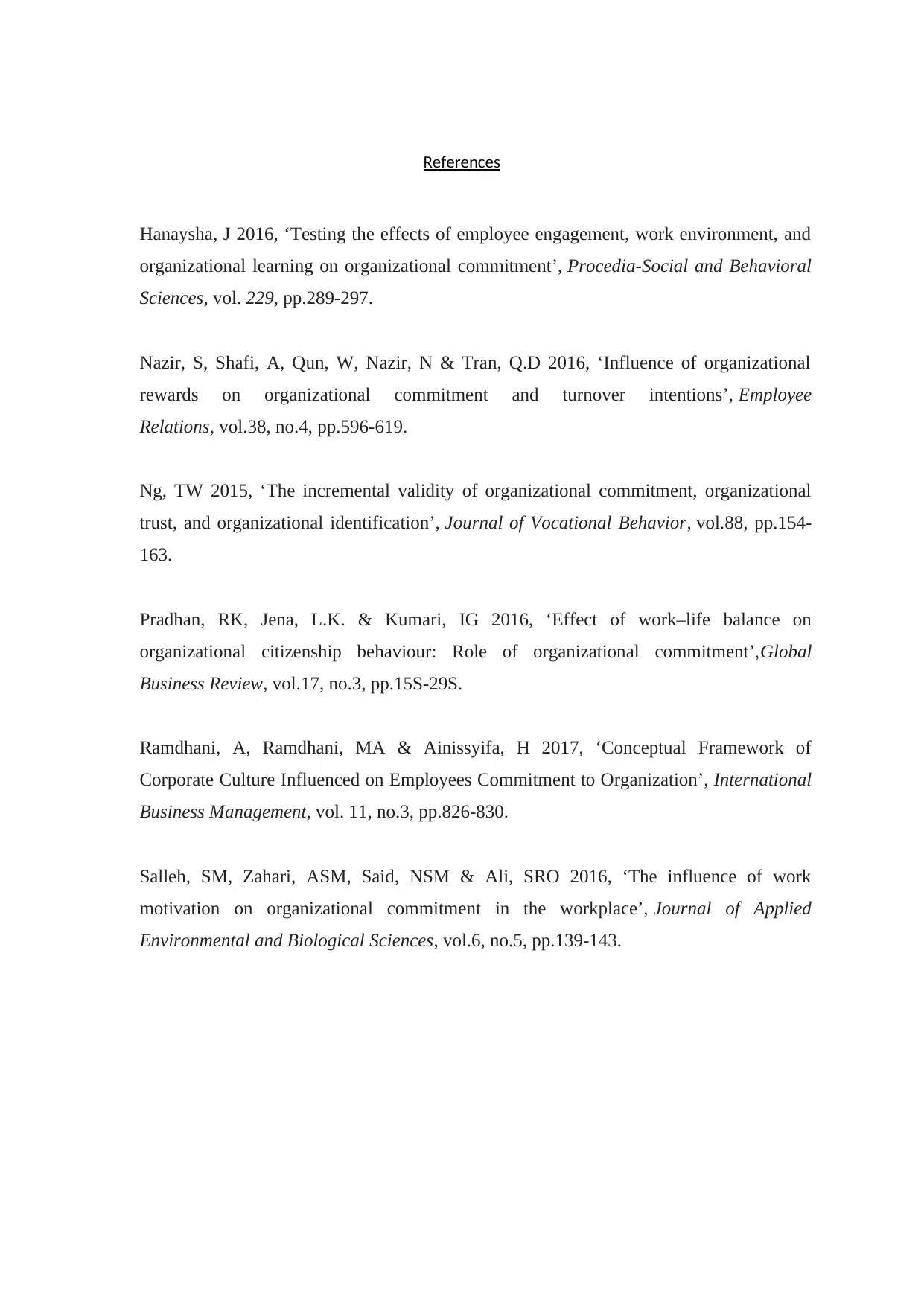Organisational Commitment and Strategies: Literature Review (MNG82001)
VerifiedAdded on 2023/04/20
|3
|1070
|346
Report
AI Summary
This assignment is a literature review focusing on organisational commitment within the context of organisational behaviour (MNG82001). The student defines organisational commitment, exploring its types and potential outcomes, such as employee retention and performance, supported by academic journal articles. The review also examines two key strategies, work-life balance and rewards, that can foster organisational commitment, citing relevant research to support each strategy. The assignment adheres to Harvard referencing style, providing in-text citations and a reference list, demonstrating an understanding of academic research and its application to organisational behaviour.

Organisational Behaviour (MNG82001)
Assignment 1(Part b): Literature Reviewdraft
Students are expected to paraphrase information from at least twoacademic journal articles to
support their answer to each question (i.e. 4in total). When doing so you must provide the correct ‘in-
text’ and ‘Reference List’ citation details. Provide a Reference List at the end of each answer.
To gain the most from this assessment activity it issuggested that students write approximately 200-
300 words for each answer.
Each question is worth 5 marks.
1. Define the term ‘Organisational Commitment’ and describe the types of organisational
outcomes it might lead to.
According to (Hanaysha 2016, p.290), organizational commitment is one of the essential
terms which are used in the concept of organization behaviour. It can be said that
fostering organizational commitment is important as it is observed that the employees
who are committed towards the company are likely to stay for long time or focus on
better performance. Also, the company’s focuses on building the organizational
commitment of the employees as they are considered as the main source of success. The
organizational commitment can also be known as the psychological attitudes that boost
the interest of the employees towards the organizational work. It also emphasizes on
reducing the turnover intention in the workplace.
According to (Ramdhani, Ramdhani & Ainissyifa 2017, p. 228), the commitment level of
the employees is related with their faithfulness towards the assigned work. It can also be
said as the willingness that exerts the efforts on the behalf of the company and it also
maintains the value between the workers and the management. The commitment level of
the employees helps to identify the identity and also the commitment level towards goals
of the employees.
The commitment level of the employees also assists in predicting the employee
performance and also the behaviour towards the work. It can be said that by
organizational commitment can also be one of the outcome of teamwork. Teamwork is
one of the aspects that impact the level of commitment of the individuals. The person in
the group will show more commitment level towards the work when the goals set by the
company is high.
Assignment 1(Part b): Literature Reviewdraft
Students are expected to paraphrase information from at least twoacademic journal articles to
support their answer to each question (i.e. 4in total). When doing so you must provide the correct ‘in-
text’ and ‘Reference List’ citation details. Provide a Reference List at the end of each answer.
To gain the most from this assessment activity it issuggested that students write approximately 200-
300 words for each answer.
Each question is worth 5 marks.
1. Define the term ‘Organisational Commitment’ and describe the types of organisational
outcomes it might lead to.
According to (Hanaysha 2016, p.290), organizational commitment is one of the essential
terms which are used in the concept of organization behaviour. It can be said that
fostering organizational commitment is important as it is observed that the employees
who are committed towards the company are likely to stay for long time or focus on
better performance. Also, the company’s focuses on building the organizational
commitment of the employees as they are considered as the main source of success. The
organizational commitment can also be known as the psychological attitudes that boost
the interest of the employees towards the organizational work. It also emphasizes on
reducing the turnover intention in the workplace.
According to (Ramdhani, Ramdhani & Ainissyifa 2017, p. 228), the commitment level of
the employees is related with their faithfulness towards the assigned work. It can also be
said as the willingness that exerts the efforts on the behalf of the company and it also
maintains the value between the workers and the management. The commitment level of
the employees helps to identify the identity and also the commitment level towards goals
of the employees.
The commitment level of the employees also assists in predicting the employee
performance and also the behaviour towards the work. It can be said that by
organizational commitment can also be one of the outcome of teamwork. Teamwork is
one of the aspects that impact the level of commitment of the individuals. The person in
the group will show more commitment level towards the work when the goals set by the
company is high.
Paraphrase This Document
Need a fresh take? Get an instant paraphrase of this document with our AI Paraphraser

According to (Ng 2015, p.156), there are different types of organizational outcome which
relates with the organizational commitment. The First is affective commitment that
emphasizes on the positive emotional feelings in relation to the company. The next is
normative commitment which is driven by the moral obligations and at last the
continuance commitment is driven by side bets.
2. Briefly describe two strategies, supported in the academic literature, that might lead to
Organisational Commitment.
According to (Pradhan, Jena & Kumari 2016, p.20), work life balance is one of the strategies
that can lead to organizational commitment. In the present scenario, the competition level is
high and due to this the employees are not able to maintain the work life balance. The large
companies also have boosted their standards in respect of time. Organizational commitment
among the employees can only be boosted when there is proper work life balance offered by
the management.
It is observed that the employee who maintains work life balance tend to be more committed
towards work as compared to the person who is not able to maintain their work life balance.
Therefore, it can be stated that work life balance should be there in the workplace so that it
could be easy to attain growth in the competitive market by enhancing the commitment level
of the employees towards their allocated task.
According to (Nazir et al. 2016, p.598) rewards can also be the strategy that can lead to
organizational commitment. It has been said that extrinsic, social and intrinsic rewards has an
important role in relation to affective and normative commitment. The research states that the
satisfaction in relation to the extrinsic benefits such as support and participation in the
decision making can affect the affective and normative commitment level of the employees.
According to (Salleh et al. 2016, p.140) Work motivation is essential in boosting the
productivity and efficiency of the employees. It is important for the management to focus on
boosting the motivation level of the employees by offering them rewards so that it could be
easy boost the level of organizational commitment. So, it can be stated that to boost the
organizational commitment level, it is important for the management to focus on considering
the strategy of rewarding the employees as it will create interest towards work and also boost
their morale towards the assigned work.
relates with the organizational commitment. The First is affective commitment that
emphasizes on the positive emotional feelings in relation to the company. The next is
normative commitment which is driven by the moral obligations and at last the
continuance commitment is driven by side bets.
2. Briefly describe two strategies, supported in the academic literature, that might lead to
Organisational Commitment.
According to (Pradhan, Jena & Kumari 2016, p.20), work life balance is one of the strategies
that can lead to organizational commitment. In the present scenario, the competition level is
high and due to this the employees are not able to maintain the work life balance. The large
companies also have boosted their standards in respect of time. Organizational commitment
among the employees can only be boosted when there is proper work life balance offered by
the management.
It is observed that the employee who maintains work life balance tend to be more committed
towards work as compared to the person who is not able to maintain their work life balance.
Therefore, it can be stated that work life balance should be there in the workplace so that it
could be easy to attain growth in the competitive market by enhancing the commitment level
of the employees towards their allocated task.
According to (Nazir et al. 2016, p.598) rewards can also be the strategy that can lead to
organizational commitment. It has been said that extrinsic, social and intrinsic rewards has an
important role in relation to affective and normative commitment. The research states that the
satisfaction in relation to the extrinsic benefits such as support and participation in the
decision making can affect the affective and normative commitment level of the employees.
According to (Salleh et al. 2016, p.140) Work motivation is essential in boosting the
productivity and efficiency of the employees. It is important for the management to focus on
boosting the motivation level of the employees by offering them rewards so that it could be
easy boost the level of organizational commitment. So, it can be stated that to boost the
organizational commitment level, it is important for the management to focus on considering
the strategy of rewarding the employees as it will create interest towards work and also boost
their morale towards the assigned work.

References
Hanaysha, J 2016, ‘Testing the effects of employee engagement, work environment, and
organizational learning on organizational commitment’, Procedia-Social and Behavioral
Sciences, vol. 229, pp.289-297.
Nazir, S, Shafi, A, Qun, W, Nazir, N & Tran, Q.D 2016, ‘Influence of organizational
rewards on organizational commitment and turnover intentions’, Employee
Relations, vol.38, no.4, pp.596-619.
Ng, TW 2015, ‘The incremental validity of organizational commitment, organizational
trust, and organizational identification’, Journal of Vocational Behavior, vol.88, pp.154-
163.
Pradhan, RK, Jena, L.K. & Kumari, IG 2016, ‘Effect of work–life balance on
organizational citizenship behaviour: Role of organizational commitment’,Global
Business Review, vol.17, no.3, pp.15S-29S.
Ramdhani, A, Ramdhani, MA & Ainissyifa, H 2017, ‘Conceptual Framework of
Corporate Culture Influenced on Employees Commitment to Organization’, International
Business Management, vol. 11, no.3, pp.826-830.
Salleh, SM, Zahari, ASM, Said, NSM & Ali, SRO 2016, ‘The influence of work
motivation on organizational commitment in the workplace’, Journal of Applied
Environmental and Biological Sciences, vol.6, no.5, pp.139-143.
Hanaysha, J 2016, ‘Testing the effects of employee engagement, work environment, and
organizational learning on organizational commitment’, Procedia-Social and Behavioral
Sciences, vol. 229, pp.289-297.
Nazir, S, Shafi, A, Qun, W, Nazir, N & Tran, Q.D 2016, ‘Influence of organizational
rewards on organizational commitment and turnover intentions’, Employee
Relations, vol.38, no.4, pp.596-619.
Ng, TW 2015, ‘The incremental validity of organizational commitment, organizational
trust, and organizational identification’, Journal of Vocational Behavior, vol.88, pp.154-
163.
Pradhan, RK, Jena, L.K. & Kumari, IG 2016, ‘Effect of work–life balance on
organizational citizenship behaviour: Role of organizational commitment’,Global
Business Review, vol.17, no.3, pp.15S-29S.
Ramdhani, A, Ramdhani, MA & Ainissyifa, H 2017, ‘Conceptual Framework of
Corporate Culture Influenced on Employees Commitment to Organization’, International
Business Management, vol. 11, no.3, pp.826-830.
Salleh, SM, Zahari, ASM, Said, NSM & Ali, SRO 2016, ‘The influence of work
motivation on organizational commitment in the workplace’, Journal of Applied
Environmental and Biological Sciences, vol.6, no.5, pp.139-143.
⊘ This is a preview!⊘
Do you want full access?
Subscribe today to unlock all pages.

Trusted by 1+ million students worldwide
1 out of 3
Related Documents
Your All-in-One AI-Powered Toolkit for Academic Success.
+13062052269
info@desklib.com
Available 24*7 on WhatsApp / Email
![[object Object]](/_next/static/media/star-bottom.7253800d.svg)
Unlock your academic potential
Copyright © 2020–2026 A2Z Services. All Rights Reserved. Developed and managed by ZUCOL.





